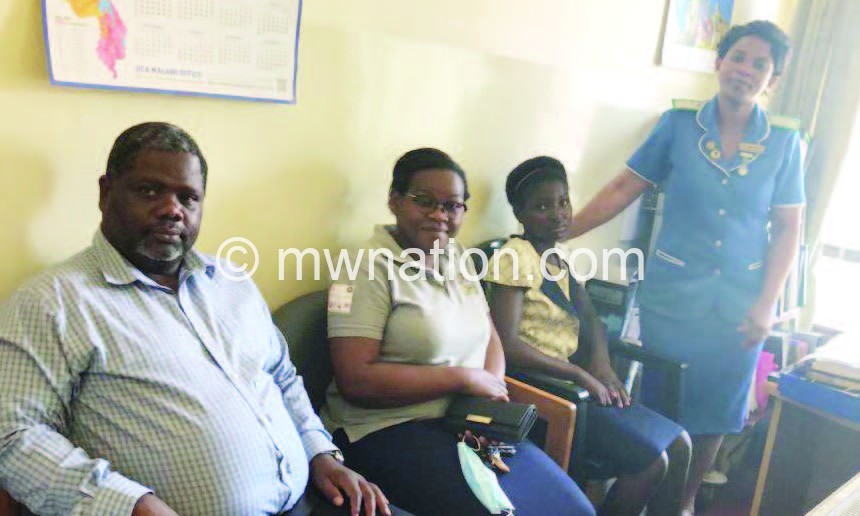Girl snatched from claws of marriage
When Miriam’s name missed not only from the list of those selected to study nursing at Kamuzu College of Nursing, but also from all lists of students selected to public universities she lost hope and nearly got married. Our staff STEVEN NHLANE tells her story:
Miriam Zgambo, 20, from Ndaba Village in Inkosi Mzikubola in Mzimba scored 15 points in the 2019/20 Malawi School Certificate Examinations (MSCE). These included five distinctions (2) in Mathematics, Biology, Chemistry, Physics and Agriculture and a credit (5) in English. In her best six subjects without English she scored 13 points.

The former Mzimba Secondary School student applied for university entrance through the National Council for Higher Education (NCHE)—the organisation that coordinates selection to public universities. She paid the K10 000 application fees.
Like all candidates of her grades, she waited with baited breath to see her name on the list of students selected to pursue her dream course—a bachelors degree in nursing and midwifery.
But when NCHE released the names, a dark cloud descended on her face and clumped her mind. Miriam’s name missed not only from the list of those selected to study nursing at Kamuzu College of Nursing, but also from all lists of students selected to public universities.
“I was devastated. I had worked so hard at MSCE. After I was not selected, I did not know where to go,” a tearful Miriam, who scored highest marks among female students at her school, explained in an interview.
As days rolled into weeks and weeks into months, Miriam slowly started losing hope of ever going back to school. It was at this point that wallowing in despair, she felt she had neither stamina nor reason to say no when her boyfriend proposed to pay lobola or bride price. Lobola symbolises a union or the coming together of the two families after bethrothal.

Says Miriam: “All along there had been enormous pressure from almost everybody in village and peers from surrounding areas for me to get married, especially that all my age mates are married; and girls younger than me were also getting married.
And so when Miriam gave the boyfriend—a primary school teacher based in Rumphi—the green light for lobola, the man wasted little time to do the needful.
“After they paid lobola, we planned to get married next year,” said Miriam, who is the first born in a family of six children; two boys and four girls. Her parents—subsistence farmers—can hardly support their children to remain in school.
According to Miriam, her 17-year-old sister dropped out of school in Standard 7 last year because of lack of parental support. All but two of her other siblings are in lower primary school classes.
It was at this point that members of the Mzimba Secondary School Alumni Association (MSSA) learnt about Miriam’s predicament. Concerned about the development, they immediately took the issue up with the Ministry of Education (MoE), who in turn, checked with NCHE. The ministry reported back a few days later to inform that Miriam did not apply for university selection.
“It seems the girl didn’t apply. [Unfortunately] she can also not appeal now because that is only done for somebody who applied,” director of Higher Education Dr McJessie Mbewe told a member of MSSA Dr Jonathan Ngoma. As things were Miriam could only apply again next year, according to Mbewe.
Surprisingly, NCHE acknowledged receiving the K10 000 application fees from Miriam, but not her application form, according to another MSSA member Beatrice Butao.
“When we followed up the issue with NCHE, they found the record for the K10 000 bank deposit Miriam made but not the application form.”
Miriam says she personally sent the application form through the Post Office at Embangweni on the same day she deposited the K10 000 application fee into the NCHE Bank Account.
“Our conclusion is that the application form got lost through Post Office,” says Butao, adding that NCHE also told them to escalate the matter to the Minister of Education.
“We could not establish whether or not Miriam’s university application form posted at Embangweni Post Office reached Mzimba or whether it got lost after Mzimba,” explains Butao.
“For ordinary mail, the only record that Post Office keeps is the number of mail items that have been received from and or dispatched to various destinations.”
With heads of cattle in the kraal as lobola, Miriam was customarily ready to be given as someone’s wife. This worried Butao.
“I invited her to come to Lilongwe so that we could explore the possibility of getting her selected to university,” she explains.
During the three weeks she hosted Miriam, she took her to various institutions where she had a chat with female professionals to reorient her for school.
“I visited Kamuzu Central Hospital [KCH] where I had a chat with Dr Jonathan Ngoma who took me around the hospital where I also had a discussion with nurses.
“I also had a chat with a female engineer. They all encouraged me to postpone marriage and that it was possible for me to realise my dream of becoming a nurse,” enthused Miriam. She also visited Lilongwe University of Agriculture and Natural Resources (Luanar) and Daeyang Private Hospital and schools of Nursing and Midwifery.
“The visit to all these institutions enlightened her,” assures Ngoma, who is the KCH director and an alumna of Mzimba Secondary School as well as a member of Bana Ba Kwa Mzikubola Trust (BMT).
Traditionally, after receiving lobola, parents are not keen to keep a daughter. Lobola itself is not marriage, but rather a part of the process of getting married under customary law. But parents are usually loath to keep both, the girl and bride wealth. So although Miriam and her fiancé had planned to get married next year, there would still have been pressure for the daughter to leave her parental home as soon as yesterday.
Meanwhile, more members of BMT some of whom are members of MSSA had heard about Miriam’s plight and started looking into how they could help her get a place at a university.
After the door at NCHE had closed for this year, BMT secured a place at University of Livingstonia (Unilia) for Miriam.
“Our interest now is to see to it that her school activities should overshadow her marriage issues,” said BMT chairperson Misheck Chisi. “Thereafter or next year, if she is offered a place at another college, we could make another decision that time. But for now, she should go to school.
“BMT is committing to support Miriam through her education. It will pay her tuition fees, accommodation, food and for groceries and pocket money. We cannot fail to support an intelligent girl like her. BMT will formerly sign an agreement with her,” he assures.
Chisi appealed to more members of BMT to contribute to Miriam’s education. “There is great enthusiasm from BMT members to ensure the girl completes her tertiary education. But we need more support.”
Through a Best Student Scholarship Fund sponsored by Ritz Attorneys, BMT has since last year also been paying tuition fees for 16 best students—two from each of the eight community day secondary schools (CDSSes)—in Mzikubola. The schools are Kazomba, Luviri, Hoho, Ehehleni, Jenda, Thoza, Mtangatanga and Emchakachakeni. Students with best scores at the end of Form 3 qualify for the scholarship.
The good news is that on Monday this week Miriam reported at Unilia where she will study for a Bachelor of Education degree in Sciences (majoring in Chemistry with Mathematics as a minor).
At 20, Miriam is legally free to get married. But not when she has great potential to further her education.
Miriam’s predicament is typical of thousands of girls who drop out of school for various reasons including early marriages, pregnancy and poverty.
Miriam, who is very excited with the opportunity to continue with school, is thankful to BMT and MSSA for fishing her out of the village where she was holed up and had lost hope of ever going back to school despite her good grades at MSCE.
By enrolling at a university, Miriam joins a small club of only one percent of Malawians who study for and graduate with a university degree.
This figure, according to Malawian historian and academician Paul Tiyambe Zeleza who is Vice-Chancellor of the Nairobi-based US International University of Africa (USIU-A), is against the African average of 13 percent and the global average of 33 percent.
But BMT and MSSA won’t be the first organisations to impact on Miriam’s life and education. Back when she was in Form 2 Mr Noel Kapito came to her rescue after her uncle who had paid her school fees in Form One told her he could no longer support her education.
“I was studying at University of Livingstonia and I was doing my Teaching Practice at Mzimba Secondary School where I was teaching Chemistry. I gave my Form 2 class a Chemistry assignment and promised to pay school fees for two students who would score highest marks in the assignment,” says Kapito.
“Coincidentally, Miriam was one of the two students, one male and one female. The boy was Madalitso Mwale. For me, all I wanted was to thank God for what he had done to me when I was in a similar situation.
“Both parents died in a space of three months when I was in Standard 7 and thereafter it was well-wishers and my church parents from St Columba CCAP in Blantyre who supported me in my education all the way to college,” enthused Kapito, who works for Luanar in the Training Department.
Miriam says her failure to get selected to university literally switched her mind off from school to marriage.
“What else was there to do?” she argues resignedly.
So what happens to the lobola and fiancé?
“He will wait and the lobola will not be returned,” says Miriam. The boyfriend, aged 25, now also plans to go back to school. He is determined to wait and to go to college even if it means starting Form 3 so that he can improve his MSCE grades and go to college,” she says.





